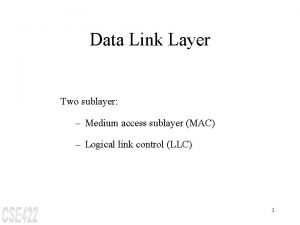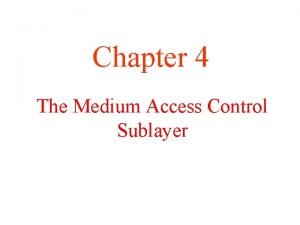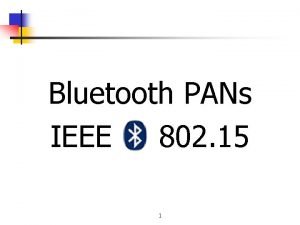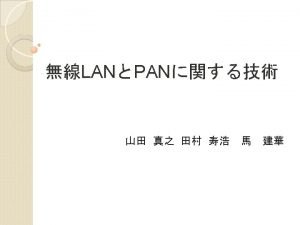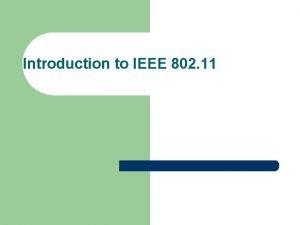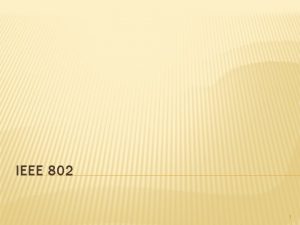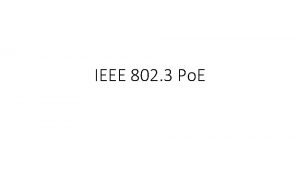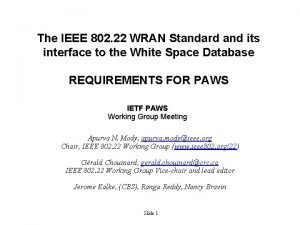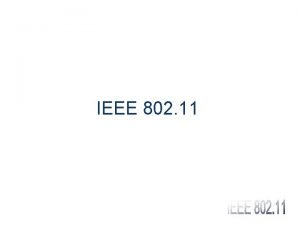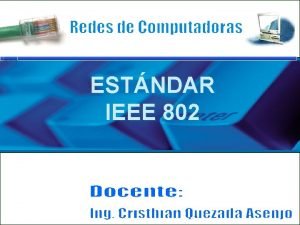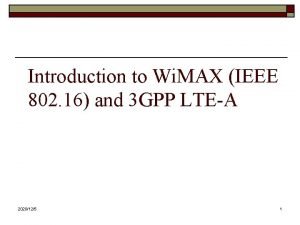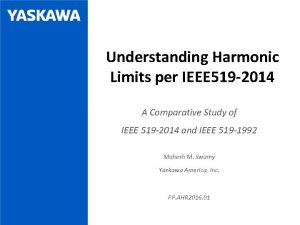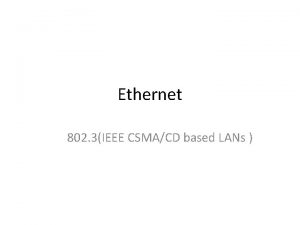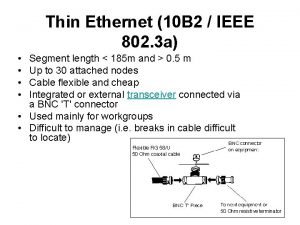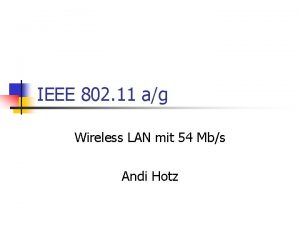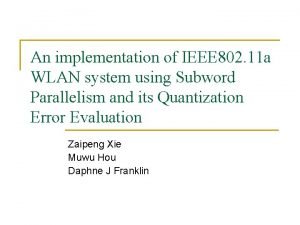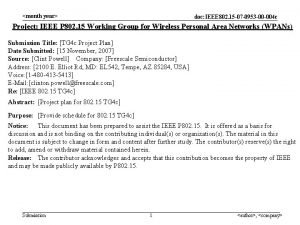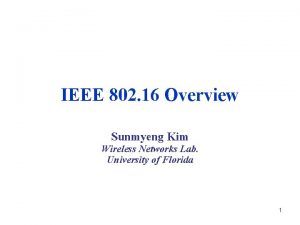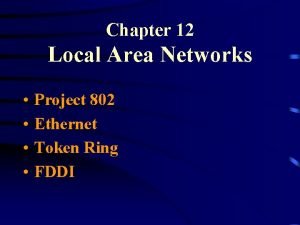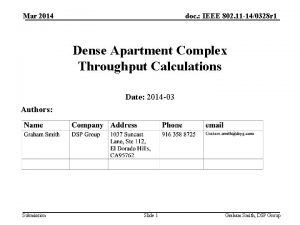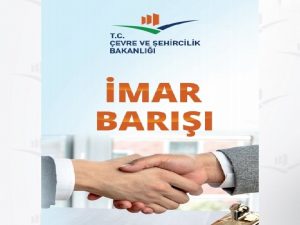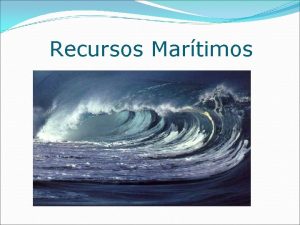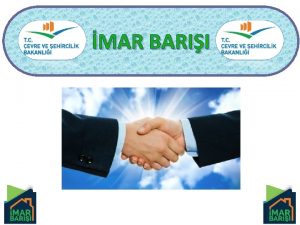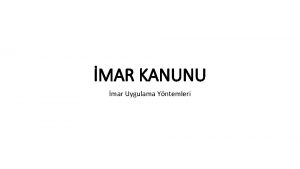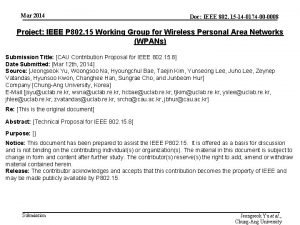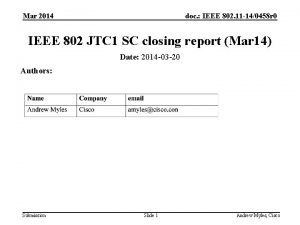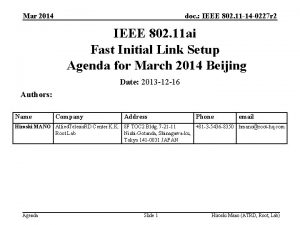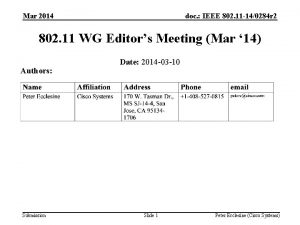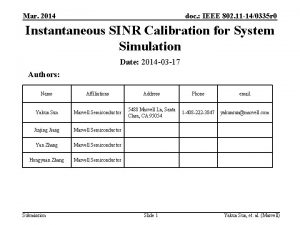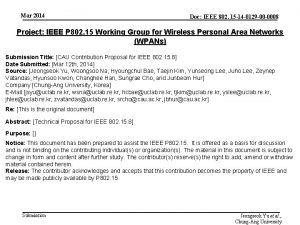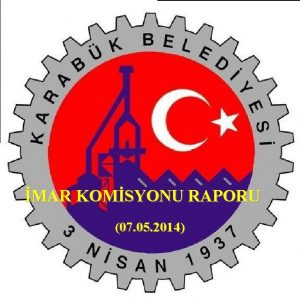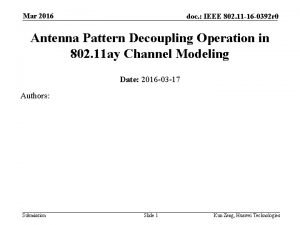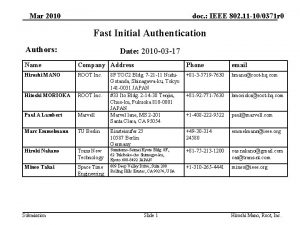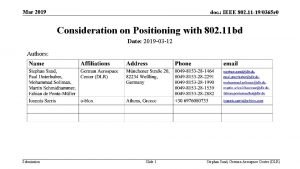Mar 2014 doc IEEE 802 11 140328 r




















- Slides: 20

Mar 2014 doc. : IEEE 802. 11 -14/0328 r 2 Dense Apartment Complex Throughput Calculations Channel Selection and DSC Date: 2014 -03 Authors: Submission Slide 1 Graham Smith, DSP Group

Mar 2014 doc. : IEEE 802. 11 -14/0328 r 2 Background – This presentation looks at the Dense Apartment scenario and calculates the throughputs – First we look at the potential overlap situation – Then we look at channel selection schemes, random and intelligent. – We then determine the resulting apartment sharing – We then simulate the traffic per STA for every apartment and present the results Submission Slide 2 Graham Smith, DSP Group

Mar 2014 doc. : IEEE 802. 11 -14/0328 r 2 3 a Dense apartment building – private access and cellular offload Pre-Conditions Each apartment has Wi-Fi network deployed to access internet and cloud services. In each apartment up to 3 users stream concurrently video content from the network and up to 50% of the networks are active. At the same time each of the active Wi-Fi networks is used by 2 users for web browsing Environment Building with 100 apartments. One AP in each apartment of 10 mx 10 m randomly positioned. 5 STA per AP randomly positioned in the apartment. Applications Cloud based applications supporting video streaming with 8 k resolution. Video throughput assumptions are: ~112 Mbps per STA, delay is < 200 ms, 1. 0 E-3 PER. Online game Cloud-based application as big storage Submission Web browsing assumptions for Social Networking are: ~20 Mbps, PER 1 e-3, delay<50 ms 150 active video users and 100 active web browsing users in the building. Traffic Conditions Strong interference from unmanaged overlapping networks (neighboring apartments, and outdoor Wi-Fi network). Multiple video display are operational simultaneously. Interference with Zigbee, Bluetooth. Use Case Users watch the high quality video contents coming from the Internet or video contents stored in their PVR with VHD Display. There may be another video streams to be recorded in the Blu-ray deck. People enjoy playing online games or local game machine with two or more people. Other users are just accessing the Internet for email access, web browsing, etc. Laurent. Smith, Cariou. DSP (Orange) Graham Slide Group 3

Mar 2014 doc. : IEEE 802. 11 -14/0328 r 2 Dense apartment complex - Legacy Submission Slide 4 Graham Smith, DSP Group

Mar 2014 doc. : IEEE 802. 11 -14/0328 r 2 Channel Selection (Channel and Overlap) vs Random Submission Slide 5 Graham Smith, DSP Group

Mar 2014 doc. : IEEE 802. 11 -14/0328 r 2 2 x 20 MHz or Share 40 MHz? Does EDCA Overhead cancel out extra subcarriers? Submission Slide 6 Graham Smith, DSP Group

Mar 2014 doc. : IEEE 802. 11 -14/0328 r 2 Dense Apartment Complex – DSC Submission Slide 7 Graham Smith, DSP Group

Mar 2014 doc. : IEEE 802. 11 -14/0328 r 2 Apartment Sharing Submission Slide 8 Graham Smith, DSP Group

Mar 2014 doc. : IEEE 802. 11 -14/0328 r 2 Apartment Sharing - DSC Tables show the number of apartments and the BW. Submission Slide 9 Graham Smith, DSP Group

Mar 2014 doc. : IEEE 802. 11 -14/0328 r 2 Traffic Simulator • Traffic Simulator has the following settings for each stream: – EDCA settings: SIFS, AIFSN, Cwmin, Cwmax, slot time – Stream settings: Aggregation, MSDU size, Mbps, – PHY: PHY Data Rate, SS, • Outputs, per stream: – Throughput: # packets in, # packets out, Mbps – Delay: per packets, max/min • EDCA contention is fully simulated with back off and retries if packets clash • If packet gets the medium, it goes through. Submission Slide 10 Graham Smith, DSP Group

Mar 2014 doc. : IEEE 802. 11 -14/0328 r 2 Throughput per STA - Sharing 4 AC_BE Streams per Network 11 n, 2 SS. Submission Slide 11 Graham Smith, DSP Group

Mar 2014 doc. : IEEE 802. 11 -14/0328 r 2 Calculations • We take the number of apartments in each sharing category and the calculate throughput per STA for the sharing. – 4 STAs per apartment, AC_BE • For example: – 10 CH Random Channel selection • • Submission 30 apartments have independent 40 MH channel 35 apartments have independent 20 MHz channel 32 apartments share a 20 MHz channel with another apartment 3 apartments share one 20 MHz channel Slide 12 Graham Smith, DSP Group

Mar 2014 doc. : IEEE 802. 11 -14/0328 r 2 Results Total Throughput As would be expected, Channel Selection and DSC improve the total throughput Submission Slide 13 Graham Smith, DSP Group

Mar 2014 doc. : IEEE 802. 11 -14/0328 r 2 DCF for Random selection of Channels Submission Slide 14 Graham Smith, DSP Group

Mar 2014 doc. : IEEE 802. 11 -14/0328 r 2 DCF for Channel Select Submission Slide 15 Graham Smith, DSP Group

Mar 2014 doc. : IEEE 802. 11 -14/0328 r 2 DCF for Random Channels (no DSC) Submission Slide 16 Graham Smith, DSP Group

Mar 2014 doc. : IEEE 802. 11 -14/0328 r 2 DCF for Random Channels (with DSC) Submission Slide 17 Graham Smith, DSP Group

Mar 2014 doc. : IEEE 802. 11 -14/0328 r 2 Results CDF (using average TP per STA) Submission Slide 18 Graham Smith, DSP Group

Mar 2014 doc. : IEEE 802. 11 -14/0328 r 2 Results CDF (using average TP per STA) Submission Slide 19 Graham Smith, DSP Group

Mar 2014 doc. : IEEE 802. 11 -14/0328 r 2 Conclusions • When estimating the per STA throughput for the dense apartment complex, it is important to include the channel selection and the resulting apartment sharing scenario. As expected, improvements to the throughput per STA occur with • Channel selection rather than random • DSC “System Level Simulators” should provide similar performances for this scenario BUT need to incorporate the Channel Selection/BW use/MCS relationships. Submission Slide 20 Graham Smith, DSP Group
 Bridges from 802.x to 802.y
Bridges from 802.x to 802.y Bridges from 802.x to 802.y
Bridges from 802.x to 802.y 802 15
802 15 802 ieee
802 ieee Ieee 802
Ieee 802 Ieee 802 family
Ieee 802 family Ieee 802 3 compliance
Ieee 802 3 compliance Wlan standards
Wlan standards Arquitetura ieee 802
Arquitetura ieee 802 Estandares ieee 802
Estandares ieee 802 Ieee 802 standard
Ieee 802 standard Ieee 519-2014
Ieee 519-2014 Ethernet 802
Ethernet 802 802-3-ethernet
802-3-ethernet Ssin-802
Ssin-802 802 701
802 701 Wireless lan 802
Wireless lan 802 Wlan 802
Wlan 802 802 15
802 15 Modulation coding scheme
Modulation coding scheme Project 802 in data communication network
Project 802 in data communication network
